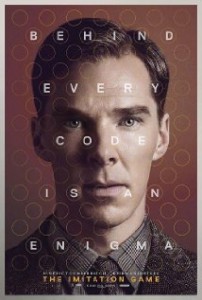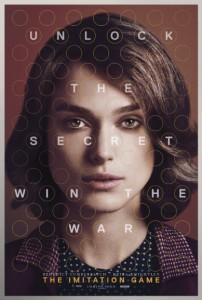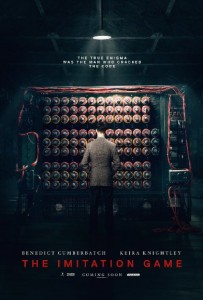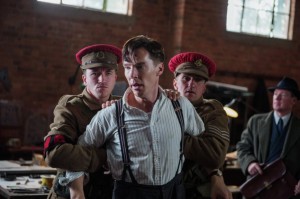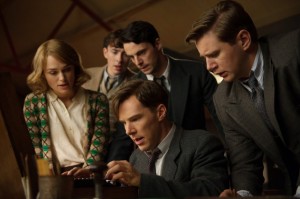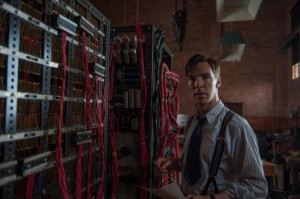The Imitation Game **** (2014, Benedict Cumberbatch, Keira Knightley, Matthew Goode) – Movie Review
Debut screenwriter Graham Moore fashions an enjoyable, popular screenplay out of Andrew Hodges‘s book about legendary cryptanalyst Alan Turing, and director Morten Tyldum makes a crowd-pleasing, old-fashioned entertainment out of it.
Turing joins the team of code-breakers at Britain’s top-secret Government Code and Cypher School at Bletchley Park in World War Two. He’s insufferably arrogant, alienating his bosses and all his colleagues. But he’s also a maths genius, and soon he’s gone to Prime Minister Winston Churchill to ask for the funding to build a machine that can crack the Germans’ all-important Enigma code. He gets to pick and run the team himself. He really must have impressed Churchill!
[Spoiler alert] After an incredible lot of work, frustration and disappointment, victory is theirs. But Turing snatches defeat from the jaws of victory, and ends up a jabbering wreck of an individual, poisoned and destroyed by the very authorities who should have been celebrating him as a national hero. The film tries to keep upbeat and entertaining but this really is not a happy story.
A perfectly cast Benedict Cumberbatch is gift to the role of Alan Turing. It is a brio tour-de-force. Charles Dance is also absolutely ideal as his (understandably) antagonistic boss, Commander Denniston. Hopefully, at awards time, both these actors will not come away empty handed.
The rest of the cast, headed by Keira Knightley and Matthew Goode, are entirely brisk and competent, doing their familiar turns well. Knightley is fine but not as well cast as Joan Clarke, the one woman in the man’s world of codes and cyphers. There’s far too much of this character anyway, and the film relentlessly sidetracks the Turing story by stressing the all-important nature of their friendship.
Goode is good as their warm-spirited code-cracking Hugh Alexander. It’s a bit of a cardboard character he’s got to play though, like many other of the film’s supporting characters. Mark Strong makes something of the sinister boss Stewart Menzies and Rory Kinnear plods through the role of Nock, the policeman who gets Turing arrested.
The film announces at the start that it’s based on a true story, which feels like what they’re saying is that it’s not really a true story at all, but a movie spin on a life story. And so, yes, that’s the key thing. Look to The Imitation Game for entertainment and enlightenment, but not for the whole truth.
It’s important to say that Turing was gay, at a time when Britain proudly and indignantly shoved men like him in jail, and then he was a gay martyr, as persecuted as Oscar Wilde was so many years earlier. Britain had hardly changed since the Victorian era. The authorities were willing to use Turing to achieve their war victory then later cheerfully and sadistically destroy him. It’s a terrible, appalling story, and this film fails to do justice to this all-important aspect of things.
Alan Turing eventually received a posthumous Royal Pardon. And only recently and reluctantly. It’s far too late, and Turing is long dead. Anger is needed and the film is very short on anger, as short on that as it is long on boyish high spirits.
The film is very like the 2001 thriller Enigma, both in subject, tone, spirit and achievement. The only thing is, that one forgot even to mention Alan Turing and the main virtue of this one is to remember him and put him back on the map as a local hero, the father of the modern computer and gay martyr.
Cumberbatch is a thoughtful sort of actor, with the gifts of intelligence and articulacy. He says: ‘The only person that should be pardoning anybody is him. Hopefully, the film will bring to the fore what an extraordinary human being he was and how appalling (his treatment by the government was). It’s a really shameful, disgraceful part of our history.’
And then on playing the role: ‘Often, as an actor, you draw on your own experience or memories, but I really didn’t have to here. Turing got under my skin. It was just so pitiful. Imagining the physical weakness, the vulnerability, the exhaustion, how the hormones affected his emotional state. It was all ungovernable.’
© Derek Winnert 2014 Movie Review
Check out more reviews on http://derekwinnert.com/

